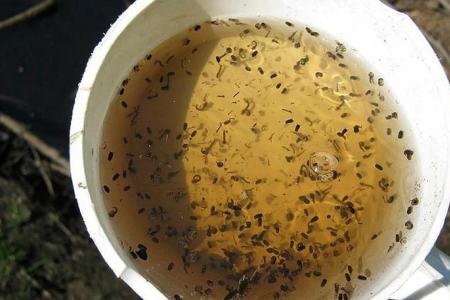Weekly dengue cases remain high; number of breeding habitats doubled in January
The number of Aedes mosquito breeding habitats found in residential premises has doubled in January 2024, compared with January 2023.
Weekly dengue cases have remained high, with 515 cases reported in the week ending Feb 10, which is more than double the number of weekly cases reported in December 2023.
As at Feb 14, more than 2,600 dengue cases have been reported in 2024, the National Environment Agency (NEA) said on Feb 15.
In homes, containers such as pails, flowerpot plates and trays, and ornamental containers like vases were found to be mosquito breeding sites, said the agency.
NEA said it found breeding in ground puddles and on canvas sheets at construction sites. Drains and discarded receptacles are considered common breeding habitats in public areas.
Some of the cases with multiple mosquito breeding habitats found by the agency include a residential area in a dengue cluster in Boon Lay.
NEA found 174 instances of mosquito breeding in January of which 101 were found in homes.
In one case in December 2023, one mop pail contained more than 900 mosquito larvae and another pail, more than 100 larvae.
More than three months after the dengue cluster was formed in Boon Lay, the agency still detected mosquito breeding there.
In another case, 90 instances of mosquito breeding were found in residential premises in a dengue cluster in Pasir Ris. Of these, 62 were found in homes.
Both the dengue clusters in Boon Lay and Pasir Ris began in November 2023 and are still active.
The agency has urged the construction industry to continue to do its part to curb transmission, by putting in place a good system of housekeeping, refuse management and routine pest control checks and treatment, to protect their workers and visitors against the disease.
NEA said everybody must do their part to put an end to the Aedes mosquito population and break the chain of transmission at their premises. It can be done by adopting measures such as breaking up hardened soil, emptying flowerpot plates, overturning pails and wiping their rims, changing water in vases and keeping roof gutters clear, and placing BTI insecticide in roof gutters, drains or water fountains to kill mosquito larvae.
The agency advised those who are diagnosed with or suspected to be infected with dengue to avoid further mosquito bites. They must apply insect repellent regularly, spray insecticide in dark corners around the house, and wear long-sleeved clothes to protect against bites.
The public can check the NEA website for dengue updates, and use the myENV mobile app to set alerts for areas with dengue clusters and high Aedes mosquito population.
Get The New Paper on your phone with the free TNP app. Download from the Apple App Store or Google Play Store now


